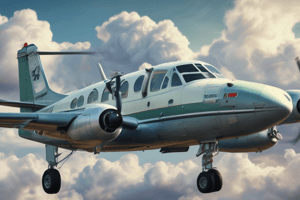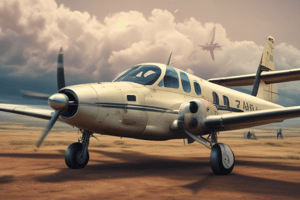Podcast
Questions and Answers
What is the primary focus of Crew Resource Management (CRM) training?
What is the primary focus of Crew Resource Management (CRM) training?
- Improving physical fitness of pilots
- Increasing individual decision-making skills solely
- Enhancing communication and teamwork in the cockpit (correct)
- Minimizing flight delays for passengers
Which of the following techniques is NOT mentioned as a method for stress reduction?
Which of the following techniques is NOT mentioned as a method for stress reduction?
- Adventure sports participation (correct)
- Mindfulness meditation
- Breathing exercises
- Progressive muscle relaxation
How can strategic napping benefit pilots?
How can strategic napping benefit pilots?
- It is critical for managing fatigue during long-haul flights (correct)
- It decreases the need for consistent sleep schedules
- It enhances cognitive abilities during short flights
- It increases energy crashes due to erratic sleep patterns
What role does nutrition play in a pilot's fatigue management?
What role does nutrition play in a pilot's fatigue management?
Which statement about sleep management for pilots is incorrect?
Which statement about sleep management for pilots is incorrect?
What type of work schedules should airlines aim to implement for better pilot management?
What type of work schedules should airlines aim to implement for better pilot management?
Which of the following leisure activities would be least beneficial for a pilot's recovery?
Which of the following leisure activities would be least beneficial for a pilot's recovery?
What is the importance of understanding circadian rhythms for pilots?
What is the importance of understanding circadian rhythms for pilots?
Which relaxation technique is suggested for pilots during breaks?
Which relaxation technique is suggested for pilots during breaks?
Which of the following is least likely to contribute to a pilot's effective rest and recovery?
Which of the following is least likely to contribute to a pilot's effective rest and recovery?
Crew Resource Management (CRM) training does not improve decision-making in the cockpit.
Crew Resource Management (CRM) training does not improve decision-making in the cockpit.
Practicing mindfulness and relaxation techniques is only beneficial if done immediately before a flight.
Practicing mindfulness and relaxation techniques is only beneficial if done immediately before a flight.
Sleep hygiene plays no role in managing fatigue for pilots.
Sleep hygiene plays no role in managing fatigue for pilots.
Strategic napping is encouraged primarily for short flights.
Strategic napping is encouraged primarily for short flights.
Pilots should consume heavy meals before flights to sustain their energy levels.
Pilots should consume heavy meals before flights to sustain their energy levels.
Time management skills are unnecessary for pilots to balance rest and recovery.
Time management skills are unnecessary for pilots to balance rest and recovery.
Airlines are encouraged to create unrealistic work schedules that do not consider circadian rhythms.
Airlines are encouraged to create unrealistic work schedules that do not consider circadian rhythms.
Breathing exercises are one of the suggested techniques for pilots to reduce stress.
Breathing exercises are one of the suggested techniques for pilots to reduce stress.
Collaboration in the cockpit has no impact on a pilot's ability to manage stress.
Collaboration in the cockpit has no impact on a pilot's ability to manage stress.
Proper hydration is deemed less critical than nutrition in managing pilot fatigue.
Proper hydration is deemed less critical than nutrition in managing pilot fatigue.
What is a primary benefit of Crew Resource Management (CRM) training for pilots?
What is a primary benefit of Crew Resource Management (CRM) training for pilots?
How can mindfulness techniques be integrated into a pilot's routine?
How can mindfulness techniques be integrated into a pilot's routine?
Describe one method pilots can use to manage fatigue during long-haul flights.
Describe one method pilots can use to manage fatigue during long-haul flights.
What role does sleep hygiene play in a pilot's performance?
What role does sleep hygiene play in a pilot's performance?
Why is it important for pilots to have a consistent sleep schedule?
Why is it important for pilots to have a consistent sleep schedule?
What impact does proper nutrition have on a pilot's energy levels?
What impact does proper nutrition have on a pilot's energy levels?
How should airlines structure work schedules to support pilot wellbeing?
How should airlines structure work schedules to support pilot wellbeing?
Name a leisure activity that can promote relaxation for pilots.
Name a leisure activity that can promote relaxation for pilots.
What is the significance of collaboration in managing cockpit stress?
What is the significance of collaboration in managing cockpit stress?
What should pilots avoid in their diet to manage fatigue effectively?
What should pilots avoid in their diet to manage fatigue effectively?
Flashcards are hidden until you start studying
Study Notes
Medical Certification and Aeromedical Factors
- Understanding turbulence in health standards is critical for aspiring pilots.
- Focus shifts to managing medication effects and psychological factors affecting pilot performance.
Managing Pilot Stress
- Stress is a psychological and physical response to demands from workload, weather, personal issues, and irregular schedules.
- Effects of stress include loss of concentration, impaired judgment, slower reaction times, headaches, fatigue, irritability, and communication breakdowns.
- Early recognition of stress signs is essential to prevent escalation that could compromise flight safety.
Pre-flight Preparation
- Strategies for minimizing stress include being well-rested, nourished, and having all necessary materials ready before flight.
- In-flight stress management requires effective cockpit resource management, clear communication, and organized task distribution.
- Post-flight routines, such as walking or reviewing performance, help with decompression and stress relief.
Support Resources
- Support can come from colleagues, aviation physicians, and airline-provided psychological resources, essential for guidance and intervention.
Personal Stress Management Plan
- Identify personal stress triggers and craft coping mechanisms like deep breathing or physical exercise.
- Regularly evaluate and adjust the effectiveness of the stress management plan.
Understanding Fatigue in Aviation
- Fatigue is a state of mental/physical exhaustion that diminishes pilot performance.
- Types of fatigue include acute (short-term) and cumulative (accumulating over time).
- Circadian fatigue arises from disruptions in the body’s natural clock due to long-haul flights.
Causes of Pilot Fatigue
- Fatigue can be caused by inadequate sleep, extended work hours, and pressures of flying.
- Consequences of flying while fatigued include poor decision-making, slower reaction times, and diminished attention.
Regulations and Management of Fatigue
- FAA regulations set limits on duty periods and rest requirements to mitigate pilot fatigue.
- Individual fatigue risk management is equally important, involving personal recognition of fatigue signs.
Techniques to Combat Fatigue
- Prioritize sleep hygiene by aiming for 7-9 hours of quality sleep in a conducive environment.
- Ergonomics and in-flight environment adjustments (e.g., comfortable seating, optimal temperature, appropriate lighting) are crucial.
Key Strategies for Managing Fatigue
- Control work and rest cycles, remain active, and use caffeine wisely to maintain alertness.
- Addressing fatigue through effective nutrition, avoiding heavy meals and stimulants, and understanding sleep hygiene is vital.
Stress and Fatigue Mitigation Strategies
- Implementing Crew Resource Management (CRM) improves communication, decision-making, and teamwork, helping reduce stress.
- Mindfulness techniques such as deep breathing and meditation are useful for maintaining focus and calm during flights.
Importance of Time Management
- Effective time management ensures off-duty time is used for rest and recovery, balancing work with leisure activities that promote relaxation.
Airline Support for Pilot Well-being
- Airlines should create realistic work schedules, considering circadian rhythms and time zone changes, and provide resources for stress management training.
Medical Certification and Aeromedical Factors
- Understanding turbulence in health standards is critical for aspiring pilots.
- Focus shifts to managing medication effects and psychological factors affecting pilot performance.
Managing Pilot Stress
- Stress is a psychological and physical response to demands from workload, weather, personal issues, and irregular schedules.
- Effects of stress include loss of concentration, impaired judgment, slower reaction times, headaches, fatigue, irritability, and communication breakdowns.
- Early recognition of stress signs is essential to prevent escalation that could compromise flight safety.
Pre-flight Preparation
- Strategies for minimizing stress include being well-rested, nourished, and having all necessary materials ready before flight.
- In-flight stress management requires effective cockpit resource management, clear communication, and organized task distribution.
- Post-flight routines, such as walking or reviewing performance, help with decompression and stress relief.
Support Resources
- Support can come from colleagues, aviation physicians, and airline-provided psychological resources, essential for guidance and intervention.
Personal Stress Management Plan
- Identify personal stress triggers and craft coping mechanisms like deep breathing or physical exercise.
- Regularly evaluate and adjust the effectiveness of the stress management plan.
Understanding Fatigue in Aviation
- Fatigue is a state of mental/physical exhaustion that diminishes pilot performance.
- Types of fatigue include acute (short-term) and cumulative (accumulating over time).
- Circadian fatigue arises from disruptions in the body’s natural clock due to long-haul flights.
Causes of Pilot Fatigue
- Fatigue can be caused by inadequate sleep, extended work hours, and pressures of flying.
- Consequences of flying while fatigued include poor decision-making, slower reaction times, and diminished attention.
Regulations and Management of Fatigue
- FAA regulations set limits on duty periods and rest requirements to mitigate pilot fatigue.
- Individual fatigue risk management is equally important, involving personal recognition of fatigue signs.
Techniques to Combat Fatigue
- Prioritize sleep hygiene by aiming for 7-9 hours of quality sleep in a conducive environment.
- Ergonomics and in-flight environment adjustments (e.g., comfortable seating, optimal temperature, appropriate lighting) are crucial.
Key Strategies for Managing Fatigue
- Control work and rest cycles, remain active, and use caffeine wisely to maintain alertness.
- Addressing fatigue through effective nutrition, avoiding heavy meals and stimulants, and understanding sleep hygiene is vital.
Stress and Fatigue Mitigation Strategies
- Implementing Crew Resource Management (CRM) improves communication, decision-making, and teamwork, helping reduce stress.
- Mindfulness techniques such as deep breathing and meditation are useful for maintaining focus and calm during flights.
Importance of Time Management
- Effective time management ensures off-duty time is used for rest and recovery, balancing work with leisure activities that promote relaxation.
Airline Support for Pilot Well-being
- Airlines should create realistic work schedules, considering circadian rhythms and time zone changes, and provide resources for stress management training.
Medical Certification and Aeromedical Factors
- Understanding turbulence in health standards is critical for aspiring pilots.
- Focus shifts to managing medication effects and psychological factors affecting pilot performance.
Managing Pilot Stress
- Stress is a psychological and physical response to demands from workload, weather, personal issues, and irregular schedules.
- Effects of stress include loss of concentration, impaired judgment, slower reaction times, headaches, fatigue, irritability, and communication breakdowns.
- Early recognition of stress signs is essential to prevent escalation that could compromise flight safety.
Pre-flight Preparation
- Strategies for minimizing stress include being well-rested, nourished, and having all necessary materials ready before flight.
- In-flight stress management requires effective cockpit resource management, clear communication, and organized task distribution.
- Post-flight routines, such as walking or reviewing performance, help with decompression and stress relief.
Support Resources
- Support can come from colleagues, aviation physicians, and airline-provided psychological resources, essential for guidance and intervention.
Personal Stress Management Plan
- Identify personal stress triggers and craft coping mechanisms like deep breathing or physical exercise.
- Regularly evaluate and adjust the effectiveness of the stress management plan.
Understanding Fatigue in Aviation
- Fatigue is a state of mental/physical exhaustion that diminishes pilot performance.
- Types of fatigue include acute (short-term) and cumulative (accumulating over time).
- Circadian fatigue arises from disruptions in the body’s natural clock due to long-haul flights.
Causes of Pilot Fatigue
- Fatigue can be caused by inadequate sleep, extended work hours, and pressures of flying.
- Consequences of flying while fatigued include poor decision-making, slower reaction times, and diminished attention.
Regulations and Management of Fatigue
- FAA regulations set limits on duty periods and rest requirements to mitigate pilot fatigue.
- Individual fatigue risk management is equally important, involving personal recognition of fatigue signs.
Techniques to Combat Fatigue
- Prioritize sleep hygiene by aiming for 7-9 hours of quality sleep in a conducive environment.
- Ergonomics and in-flight environment adjustments (e.g., comfortable seating, optimal temperature, appropriate lighting) are crucial.
Key Strategies for Managing Fatigue
- Control work and rest cycles, remain active, and use caffeine wisely to maintain alertness.
- Addressing fatigue through effective nutrition, avoiding heavy meals and stimulants, and understanding sleep hygiene is vital.
Stress and Fatigue Mitigation Strategies
- Implementing Crew Resource Management (CRM) improves communication, decision-making, and teamwork, helping reduce stress.
- Mindfulness techniques such as deep breathing and meditation are useful for maintaining focus and calm during flights.
Importance of Time Management
- Effective time management ensures off-duty time is used for rest and recovery, balancing work with leisure activities that promote relaxation.
Airline Support for Pilot Well-being
- Airlines should create realistic work schedules, considering circadian rhythms and time zone changes, and provide resources for stress management training.
Studying That Suits You
Use AI to generate personalized quizzes and flashcards to suit your learning preferences.




